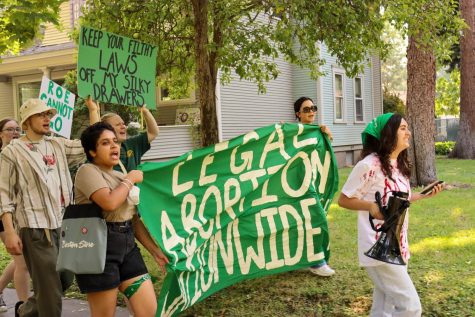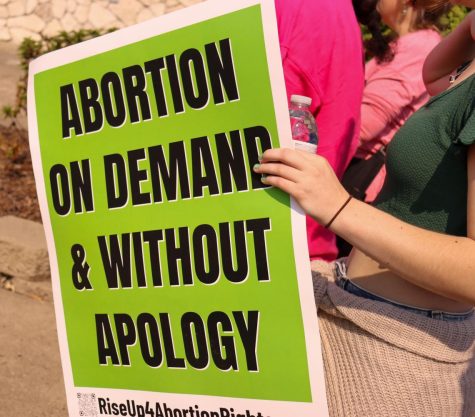Walla Walla community comes together for pro-choice protest
September 15, 2022
This past summer, communities nationwide joined together to protest for both women’s rights and abortion rights following the Supreme Court’s overturning of Roe v. Wade on June 24. On Sept. 10, members of the Walla Walla community met at Pioneer Park to protest for abortion rights.
The event was organized by RiseUp4AbortionRights. Founded earlier this year in response to the Supreme Court’s leaked decisions on abortion rights, the nonviolent movement exploded nationwide in the months leading up to the overturning of Roe v. Wade.
The protest in Walla Walla began around noon on Saturday. Speeches were given by Faviola Lopez from Planned Parenthood, Danielle Estelle Ramsay with Pioneer United Methodist Church and Danielle Garbe Reser, who is running as a write-in candidate for Walla Walla County Commissioner.

Protestors marched from Pioneer Park to the Walla Walla County Courthouse on Main Street. Once at the courthouse and equipped with a megaphone, protestors spoke about why they were participating and what abortion rights mean to them.
Local physician Linda Gunshefski was among the protestors who spoke into the megaphone. She talked about why abortion rights matter to her and what the cost is for women living in states where abortion is banned.
“As a physician and surgeon, I can tell you that women are going to suffer and die because of the criminalization of abortion,” Gunshefski said. “Women presenting to emergency departments with abdominal pain or vaginal bleeding are now treated differently in Washington State compared to Idaho. Imagine delaying seeking medical care out of fear of being arrested.”
Gunshefski also described what medical practices in states with abortion bans have been authorized.
“Hospitals in forced-birth states now utilize attorneys in the medical decision-making process,” Gunshefski said. “In Texas, oncologists now must wait for pregnant women with diseases such as cancer to first get sicker before treating them if the necessary treatments could potentially injure a zygote or fetus.”
Visiting Assistant Professor of Anthropology and Gender Studies Meiver De la Cruz participated as a private citizen and stressed the need for protests.
“Although abortions are still accessible in the state of Washington, protesting has great affective power. It is important as a display of national solidarity,” De la Cruz said. “Protests serve as a tool to build public awareness and help recruit people into the movement.”
Around 50 to 70 members of the Walla Walla community attended the protest, a number of whom were students from Whitman. Senior Willie Schack was one of the students in attendance.
“I came out because I believe in fighting for human rights and people’s rights to decide what they do with their own body,” Schack said.
While Schack was not the only person from the Whitman community to participate, he was disappointed in the low number of those who did.
“As a student who has attended Whitman for three plus years now, I was frankly a little disappointed that I didn’t see more Whitties come out to show their support,” Schack said. “To those who didn’t come today, I hope to see you next time. Come support your fellow students and make your voice heard, because it matters.”

De la Cruz sees protests as a way of connecting local dissent with a growing national movement.
“I attended the protest in support of, and as part of, a national intersectional movement for bodily autonomy for all people, including those who need abortions and those who want to parent,” De la Cruz said. “It’s important to connect the local to the national: we understand that just because there are abortion protections here in Washington now, this doesn’t mean that it is guaranteed that laws will stay that way.”
Gunshefski advised students on the necessity of getting involved in the political process. Her main call to action was encouraging students to vote.
“Whitman students need to organize against these unjust and inhumane laws that negatively affect your future,” Gunshefksi said. “We can no longer support candidates, political parties or businesses who do not support the right to a medically safe abortion. Politicians should not be making personal decisions for you. This is your life and future.”





